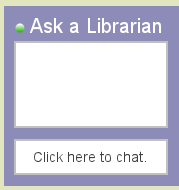Information Update - Fall 2010
Library Develops Assessment Plan for Information Literacy
- The Weinberg Memorial Library has developed an assessment plan in order to measure the quality and the effectiveness of its Information Literacy Program and the contributions that this program makes to enhance student learning. This plan is based on the concept of assessment-as-learning, which places the focus of information literacy instruction on student learning rather than on content.
- After participating in a brainstorming session on how they would answer the question, "What does an excellent Information Literacy program do?," the library faculty selected four outcomes on which to focus for 2010-2011. In order to implement those outcomes, the library has adopted the following plan of action:
- In addition to tracking the departments of faculty members who schedule Information Literacy sessions, their colleges will also be recorded. Librarians will make an effort to reach out to new faculty each year. This includes faculty who are new to the University as well as faculty who haven't collaborated with library faculty in the past. The library's goal is for library faculty and academic faculty to collaborate on designing library assignments that focus on information literacy skills and that are integrated into the curriculum. Charles Kratz, dean of the library and information fluency, has announced that five Information Literacy stipends will be offered again this year to encourage collaboration. Since their inception in 2005, the library has awarded a total of 24 stipends.
- Library faculty will integrate assessment into their Information Literacy sessions based on the student learning outcomes that they have defined prior to the session. Dr. André Oberlé, director of the CTLE, presented a workshop to library faculty during the spring semester to assist them in defining and constructing student learning outcomes. A SMART Board interactive whiteboard has been added to one of the library's Information Literacy Instruction labs, which will provide an opportunity for active learning. In July, Jason Oakey, from the Office of Instructional Technology, conducted an in-service for library faculty on the use of the SMART Board. Librarians will be documenting the student learning that they observe in their Information Literacy sessions. They anticipate that students' Information Literacy skills will grow as a result of this new focus.
- The library will continue to foster opportunities for students, both undergraduate and graduate, to learn about academic integrity through the Academic Integrity Tutorials. This will be the fourth year that students who are new to The University of Scranton will take these tutorials, and the second year that students will have the opportunity to tell us what they think about the tutorials and about academic integrity by taking a post-tutorial survey. The library will be encouraging greater use of Turnitin.com, an online service that allows faculty members to check the originality of student papers. A new feature that was added in 2010 is the ability to place a specifically designed Turnitin.com Drop Box in any ANGEL course that allows students to submit their papers to Turnitin through ANGEL.
- Users will be queried about their experiences using library resources and services. Responses will be compiled and assessed by librarians who will develop a plan to implement suggested improvements that will enable the library to connect with our users in a personal and memorable way.
- If you would like to schedule an Information Literacy session for your class, or if you would like more information about Turnitin.com, contact Bonnie Oldham, information literacy coordinator.
Bonnie Oldham

